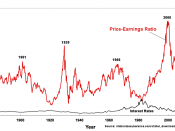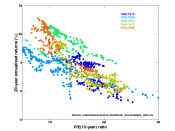1.The market efficiency concept
The efficient market hypothesis (EMH) is a theory developed in academia in the mid-1960s. It holds that all securities are priced rationally in the market, that is, that prices fully reflect all available information. Because all information is contained in stock prices it is impossible to beat the market over time without taking on excess risk.
Competition between rational investors keeps prices about where they should be. As all information that determines stock prices are analyzed by numbers of investors, stock quotes reflect the best estimates of their value. Prices may not always be right, but they are unbiased. So if they're wrong, they're just as likely to be too high as too low compared to a kind of optimal value.
Because the market is efficient, investors should expect only a fair return relative to the risk of purchasing a particular stock. Risk is defined as volatility.
The greater the volatility of the stock or portfolio compared to the overall market, the greater the risk. Since the market efficiently values risk and return, securities with greater risk should provide greater rewards.
Strong and weak forms of EMH
Strong form of EMH. The assumption is that market prices constantly reflect the net intelligence of all the many participants acting independently, and so its evaluation is better than that of individuals. Thus, the market's pricing of an item is the best estimate of its value. So, the market is an arena where many rational, profit maximizing investors, with roughly equal access to information, are competing in trying to predict the future course of prices - and cancel each other out. The market reacts immediately and correctly to new information as it arrives. Thus investors cannot benefit from it. An investor can't beat the market using public...


